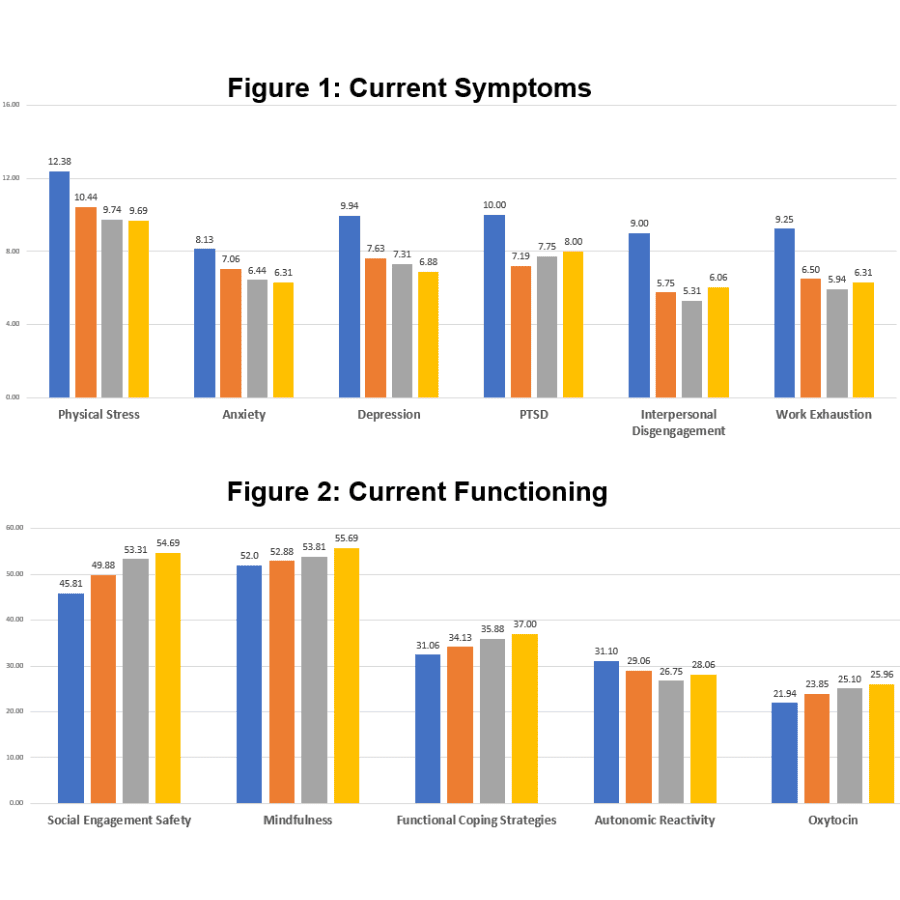SUPPORTING RESEARCH
SUPPORTING RESEARCH
Find Somatic Solutions to Enhance Wellness
The Somatic Understanding Research Foundation (SURF) is dedicated to pioneering research on the mind-body connection. Our studies explore how physical experiences influence emotional well-being and how psychological states affect the body. Through cutting-edge research, SURF aims to uncover new insights that promote healing and enhance overall human health.

CURRENT RESEARCH

Benefits of Somatic Intervention Informed by Polyvagal Theory
Lourdes P Dale, PhD; Audrey Dana, BS; Hans P. Nazarloo, MD, PhD; Deborah Brabham, PhD; Sue Carter, PhD; Stephen W. Porges, PhD; Steven Cuffe, MD; & Donnalea Van Vleet Goelz, PhD
Background
Healthcare providers, especially nurses, are experiencing high rates of anxiety, depression, and burnout (Guastello et al., 2024). They also report higher levels of autonomic reactivity (Dale et al., 2022), which is consistent with the polyvagal theory (Porges, 1995, 2007, 2022) belief that stress and trauma lead to autonomic dysregulation. Thus, nurses may benefit from a somatic intervention informed by Polyvagal Theory, which was developed by an expert in somatic therapy (Goelz, 2015), which address autonomic reactivity and may enhance wellness.
CURRENT RESEARCH

Benefits of Somatic Intervention Informed by Polyvagal Theory
Lourdes P Dale, PhD; Audrey Dana, BS; Hans P. Nazarloo, MD, PhD; Deborah Brabham, PhD; Sue Carter, PhD; Stephen W. Porges, PhD; Steven Cuffe, MD; & Donnalea Van Vleet Goelz, PhD
Background
Healthcare providers, especially nurses, are experiencing high rates of anxiety, depression, and burnout (Guastello et al., 2024). They also report higher levels of autonomic reactivity (Dale et al., 2022), which is consistent with the polyvagal theory (Porges, 1995, 2007, 2022) belief that stress and trauma lead to autonomic dysregulation. Thus, nurses may benefit from a somatic intervention informed by Polyvagal Theory, which was developed by an expert in somatic therapy (Goelz, 2015), which address autonomic reactivity and may enhance wellness.
Objective
Determine if the intervention leads to improvements in social engagement, mindfulness, functional coping strategies, psychiatric symptomatology, autonomic reactivity, and neuroendocrine regulation (i.e., increased oxytocin levels).
Methods
Nurses agreed to participate either in person or virtually in the intervention. The 90-minute classes occurred weekly over three weeks. Following each class, participants were instructed to practice the skills learned.
Data was collected before, immediately after, and 1- and 4 -weeks post the intervention.
The 16 female nurses who completed all classes and evaluations were predominately white (88%) and varied in age from 24 to 55 years old (M = 40.87, SD 10.30).
Results/Discussion
- As reported in Figures 1/2 and Table 2 and, the nurses reported significant improvements following the intervention.
- As reported in Table 1, the nurses who frequently practiced what they learned reported greater benefits from Time 1 to Time 4 than the nurses who did not practice frequently. They reported greater increases in social engagement and mindfulness; and greater decreases anxiety, depression, interpersonal disengagement, and autonomic reactivity.
- The results of this pilot study suggest that this intervention may be extremely beneficial to individuals with mental health and related difficulties. The reported improvements were further supported by the observed increases in the biomarker oxytocin.
References
For Research Details and Downloadable PDF Click Here
ABOUT OUR
Collaborating Researchers
The Somatic Understanding Research Foundation (SURF) is a nonprofit that helps fund and explore the advancing research on the mind-body connection, exploring how physical experiences influence emotions and health. It supports studies on trauma recovery, stress, and movement’s impact on emotions. SURF uses funds solely for research and collaborates with experts to promote evidence-based approaches to improve well-being.

Stephen Porges Ph.D.
Stephen Porges Ph.D. is Distinguished University Scientist at Indiana University where he is the founding director of the Traumatic Stress Research Consortium. He is the originator of the Polyvagal Theory, a theory that emphasizes the importance of physiological state in the expression of behavioral, mental, and health problems related to traumatic experiences. He is the author of The Polyvagal Theory: Neurophysiological foundations of Emotions, Attachment, Communication, and Self-regulation (Norton, 2011), The Pocket Guide to the Polyvagal Theory: The Transformative Power of Feeling Safe, (Norton, 2017) and co-editor of Clinical Applications of the Polyvagal Theory: The Emergence of Polyvagal-Informed Therapies (Norton, 2018). He is Professor of Psychiatry at the University of North Carolina, and Professor Emeritus at both the University of Illinois at Chicago and the University of Maryland. He has published more than 300 peer‐reviewed scientific papers across several disciplines that have been cited in more than 30,000 peer-reviewed papers.

Sue Carter Ph.D.
Sue Carter Ph.D. is a Professor of Psychology at the University of Virginia and also a Distinguished University Scientist at Indiana University, Bloomington. Dr. Carter is the scientist who first discovered the relationship between oxytocin and social monogamy and the formation of adult social bonds. She is currently examining the developmental effects of oxytocin pathways and their role promoting in the capacity for social bonding, parental behavior, and healthy relationships across the lifecycle. She is the former Executive Director of the Kinsey Institute and a Rudy Professor Emerita of Biology. She has authored more than 400 publications and edited 5 books including ‘Attachment and Bonding: A New Synthesis’ (MIT Press).
All Funds Are Used For Research
Support Groundbreaking Somatic Understanding & Transform Lives
SURF is gathering donations for three Mind-Body Wellness Funds. The three funds are described below- please let us know in the “Donor Notes” box below if you have a preference for which fund you would like your donation to support.
